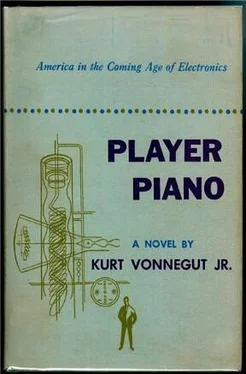"And you remember nothing?"
"I remember a man named Alfy, who makes his living as a television shark, a man named Luke Lubbock, who can be whatever his clothes are, a minister who gets a kick out of seeing the world go to hell, and -"
"And Barbara and Martha."
"And Barbara and Martha. And parades - my God, parades."
"Feel better?"
"No. But you should, because I think Finnerty's found a new home and a new friend."
"Thank God for that. I want you to make it clear to Kroner tonight that he forced himself on our hospitality, that we were as upset by him as anyone was."
"That isn't quite true."
"Well then, keep it to yourself, if you like him so much."
She lifted the lid of the schoolmaster's desk, where she made out the daily menus and compared her stubs with the bank statements, and took from it three sheets of paper. "I know you think I'm silly, but it's worth a little trouble to do things right, Paul."
The papers contained some sort of an outline, with major divisions set off by Roman numerals, and with sub-sub-sub-sub-sub-divisions as small as (a). At random, and with his headache taking on new vitality, he chose item III., A., I., a.: "Don't smoke. Kroner is trying to break the habit."
"Maybe it would help to read it aloud," said Anita.
"Maybe it'd be better if I read it alone, where there aren't any distractions."
"It took most of the afternoon."
"I expect it did. It's the most thorough job you've done yet. Thanks, darling, I appreciate it."
"I love you, Paul."
"I love you, Anita."
"Darling - about Martha and Barbara -"
"I promise you, I didn't touch them."
"I was going to ask, did anybody see you with them?"
"I guess they did, but nobody of any importance. Not Shepherd, certainly."
"If it ever got back to Kroner, I don't know what I'd do. He might laugh off the drinking, but the women - "
"I went to bed with Barbara," said Paul suddenly.
"I thought you did. That's your affair." She was tiring of the conversation, apparently, and she looked restively at the television screen.
"And Shepherd saw me coming downstairs with her."
"Paul!"
"Joke."
She put her hand over her heart. "Oh - thank the Lord."
" 'Summer Loves,' " said Paul, looking at the television screen judiciously.
"What's that?"
"The band - they're playing 'summer Loves.' " He whistled a few bars.
"How can you tell, with the volume off?"
"Go ahead, turn it up."
Apathetically, she turned the knob, and "Summer Loves," as sweet and indigestible as honey cake, oozed into the air.
Humming along with the orchestra, Paul went up the steps to his bedroom, reading the outline as he went:
"IV., A., I. If Kroner asks you why you want Pittsburgh, say it is because you can be of greater service . . . a. Soft-pedal bigger house and raise and prestige."
Fuzzily, Paul was beginning to see that he had made an ass of himself in the eyes of those on both sides of the river. He remembered his cry of the night before: "We must meet in the middle of the bridge!" He decided that he would be about the only one interested in the expedition, the only one who didn't feel strongly about which bank he was on.
If his attempt to become the new Messiah had been successful, if the inhabitants of the north and south banks had met in the middle of the bridge with Paul between them, he wouldn't have had the slightest idea of what to do next. He knew with all his heart that the human situation was a frightful botch, but it was such a logical, intelligently arrived-at botch that he couldn't see how history could possibly have led anywhere else.
Paul did a complicated sum in his mind - his savings account plus his securities plus his house plus his cars - and wondered if he didn't have enough to enable him simply to quit, to stop being the instrument of any set of beliefs or any whim of history that might raise hell with somebody's life. To live in a house by the side of a road. . . .
THE SHAH OF BRATPUHR, looking as tiny and elegant as a snuffbox in one end of the vast cavern, handed the Sumklish bottle back to Khashdrahr Miasma. He sneezed, having left the heat of summer above a moment before, and the sound chattered along the walls to die whispering in bat roosts deep in Carlsbad Caverns.
Doctor Ewing J. Halyard was making his thirty-seventh pilgrimage to the subterranean jungle of steel, wire, and glass that filled the chamber in which they stood, and thirty larger ones beyond. This wonder was a regular stop on the tours Halyard conducted for a bizarre variety of foreign potentates, whose common denominator was that their people represented untapped markets for America's stupendous industrial output.
A rubber-wheeled electric car came to a stop by the elevator, where the Shah's party stood, and an Army major, armed with a pistol, dismounted and examined their credentials slowly, thoroughly.
"Couldn't we speed this up a little, Major?" said Halyard. "We don't want to miss the ceremony."
"Perhaps," said the major. "But, as officer of the day, I'm responsible for nine billion dollars worth of government property, and if something should happen to it somebody might be rather annoyed with me. The ceremony has been delayed, anyway, so you won't miss anything. The President hasn't showed up yet."
The major was satisfied at last, and the party boarded the open vehicle.
" Siki? " said the Shah.
"This is EPICAC XIV," said Halyard. "It's an electronic computing machine - a brain, if you like. This chamber alone, the smallest of the thirty-one used, contains enough wire to reach from here to the moon four times. There are more vacuum tubes in the entire instrument than there were vacuum tubes in the State of New York before World War II." He had recited these figures so often that he had no need for the descriptive pamphlet that was passed out to visitors.
Khashdrahr told the Shah.
The Shah thought it over, snickered shyly, and Khashdrahr joined him in the quiet, Oriental merriment.
"Shah said," said Khashdrahr, "people in his land sleep with smart women and make good brains cheap. Save enough wire to go to moon a thousand times."
Halyard chuckled appreciatively, as he was paid to do, wiped aside the tears engendered by his ulcer, and explained that cheap and easy brains were what was wrong with the world in the bad old days, and that EPICAC XIV could consider simultaneously hundreds or even thousands of sides of a question utterly fairly, that EPICAC XIV was wholly free of reason - muddying emotions, that EPICAC XIV never forgot anything - that, in short, EPICAC XIV was dead right about everything. And Halyard added in his mind that the procedure described by the Shah had been tried about a trillion times, and had yet to produce a brain that could be relied upon to do the right thing once out of a hundred opportunities.
They were passing the oldest section of the computer now, what had been the whole of EPICAC I, but what was now little more than an appendix or tonsil of EPICAC XIV. Yet, EPICAC I had been intelligent enough, dispassionate enough, retentive enough to convince men that he, rather than they, had better do the planning for the war that was approaching with stupifying certainty. The ancient phrase used by generals testifying before appropriation committees, "all things considered," was given some validity by the ruminations of EPICAC I, more validity by EPICAC II, and so on, through the lengthening series. EPICAC could consider the merits of high-explosive bombs as opposed to atomic weapons for tactical support, and keep in mind at the same time the availability of explosives as opposed to fissionable materials, the spacing of enemy foxholes, the labor situation in the respective processing industries, the probable mortality of planes in the face of enemy antiaircraft technology, and on and on, if it seemed at all important, to the number of cigarettes and Cocoanut Mound Bars and Silver Stars required to support a high-morale air force. Given the facts by human beings, the war-born EPICAC series had offered the highly informed guidance that the reasonable, truth-loving, brilliant, and highly trained core of American genius could have delivered had they had inspired leadership, boundless resources, and two thousand years.
Читать дальше








![Курт Воннегут - Вампитеры, фома и гранфаллоны [litres]](/books/397997/kurt-vonnegut-vampitery-foma-i-granfallony-litre-thumb.webp)